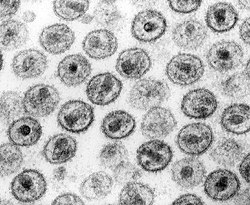
Back MIV/vigsontkenning Afrikaans إنكار متلازمة نقص المناعة المكتسبة Arabic HİV dissidentlik Azerbaijani AIDS-Leugnung German Aidoso-retaksado Esperanto Negacionismo del VIH/sida Spanish GIB/HIESaren negazionismoa Basque انکار ایدز Persian Contestation de la responsabilité du VIH dans le sida French HIV/AIDS-ûntkenning Frisian

| Part of a series on |
| Alternative medicine |
|---|
 |
HIV/AIDS denialism is the belief, despite conclusive evidence to the contrary, that the human immunodeficiency virus (HIV) does not cause acquired immune deficiency syndrome (AIDS).[1][2][3] Some of its proponents reject the existence of HIV, while others accept that HIV exists but argue that it is a harmless passenger virus and not the cause of AIDS. Insofar as they acknowledge AIDS as a real disease, they attribute it to some combination of sexual behavior, recreational drugs, malnutrition, poor sanitation, haemophilia, or the effects of the medications used to treat HIV infection (antiretrovirals).[4][5]
The scientific consensus is that the evidence showing HIV to be the cause of AIDS is conclusive[1][2] and that HIV/AIDS denialist claims are pseudoscience based on conspiracy theories,[6] faulty reasoning, cherry picking, and misrepresentation of mainly outdated scientific data.[1][2][7] As evidence mounted against denialism, combined with those with HIV/AIDS living much longer, these claims stopped being believed.[8] With the rejection of these arguments by the scientific community, HIV/AIDS denialist material is now targeted at less scientifically sophisticated audiences and spread mainly through the Internet,[9][10] increased substantially since the COVID-19 pandemic.[8]
Despite its lack of scientific acceptance, HIV/AIDS denialism has had a significant political impact, especially in South Africa under the presidency of Thabo Mbeki. Scientists and physicians have raised alarm at the human cost of HIV/AIDS denialism, which discourages HIV-positive people from using proven treatments.[2][9][11][12][13][14] Public health researchers have attributed 330,000 to 340,000 AIDS-related deaths, along with 171,000 other HIV infections and 35,000 infant HIV infections, to the South African government's former embrace of HIV/AIDS denialism.[15][16] The interrupted use of antiretroviral treatments is also a major global concern as it potentially increases the likelihood of the emergence of antiretroviral-resistant strains of the virus.[17]
- ^ a b c Cite error: The named reference
iomreportwas invoked but never defined (see the help page). - ^ a b c d "The Evidence that HIV Causes AIDS". National Institute of Allergy and Infectious Disease. 4 September 2009. Archived from the original on 16 September 2017. Retrieved 14 October 2009.
- ^ Kalichman 2009, p. 205.
- ^ Cohen, J (1994). "Duesberg and critics agree: Hemophilia is the best test". Science. 266 (5191): 1645–6. Bibcode:1994Sci...266.1645C. doi:10.1126/science.7992044. PMID 7992044.
- ^ Kalichman 2009.
- ^ Kalichman, SC (1 January 2014). "The Psychology of AIDS Denialism". European Psychologist. 19 (1): 13–22. doi:10.1027/1016-9040/a000175.
- ^ "Denying science". Nat. Med. 12 (4): 369. 2006. doi:10.1038/nm0406-369. PMID 16598265.
To support their ideas, some AIDS denialists have also misappropriated a scientific review in Nature Medicine which opens with this reasonable statement: "Despite considerable advances in HIV science in the past 20 years, the reason why HIV-1 infection is pathogenic is still debated."
- ^ a b Merlan, Anna (7 August 2024). "How covid conspiracies led to an alarming resurgence in AIDS denialism". MIT Technology Review. Retrieved 7 August 2024.
- ^ a b Cite error: The named reference
SmithNovellawas invoked but never defined (see the help page). - ^ Steinberg, J (17 June 2009). "AIDS denial: A lethal delusion". New Scientist. 2713. Retrieved 14 October 2009.
- ^ Cohen, J (December 1994). "The Duesberg phenomenon" (PDF). Science. 266 (5191): 1642–4. Bibcode:1994Sci...266.1642C. doi:10.1126/science.7992043. PMID 7992043. Retrieved 22 June 2009.
- ^ Watson, J (2006). "Scientists, activists sue South Africa's AIDS 'denialists'". Nat. Med. 12 (1): 6. doi:10.1038/nm0106-6a. PMID 16397537. S2CID 3502309.
- ^ Boseley, S (14 May 2005). "Discredited doctor's 'cure' for Aids ignites life-and-death struggle in South Africa". The Guardian. London. Retrieved 14 October 2009.
- ^ "The Durban Declaration". Nature. 406 (6791): 15–6. 2000. doi:10.1038/35017662. PMID 10894520. S2CID 205007392.
- ^ Chigwedere, P; Seage, GR; et al. (October 2008). "Estimating the lost benefits of antiretroviral drug use in South Africa". Journal of Acquired Immune Deficiency Syndromes. 49 (4): 410–15. doi:10.1097/QAI.0b013e31818a6cd5. PMID 19186354. S2CID 11458278.
- ^ Nattrass, N (February 2008). "AIDS and the scientific governance of medicine in post-Apartheid South Africa". African Affairs. 107 (427): 157–76. doi:10.1093/afraf/adm087.
- ^ Tang, MW; Shafer, RW (2012). "HIV-1 antiretroviral resistance: scientific principles and clinical applications". Drugs. 72 (9): e1–25. doi:10.2165/11633630-000000000-00000. PMC 3689909. PMID 22686620.